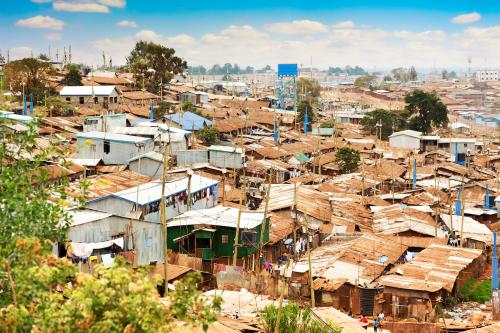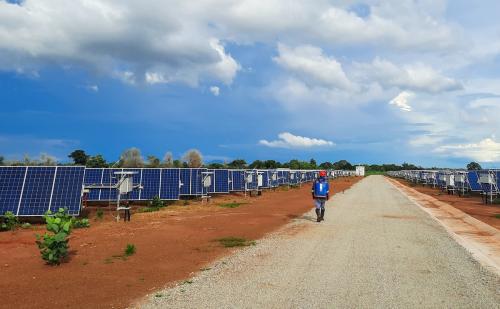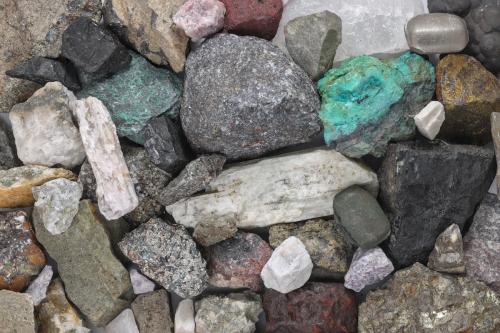This viewpoint is part of Foresight Africa 2024.
Africa can assist Europe and the world in addressing all their major challenges, both current and future. It is time to view our continent not as a risk factor but as a great opportunity for the world.
Climate change is real for us in Cabo Verde, a large oceanic state but a small archipelagic country. We can see this reality in the rise of sea levels, coastal erosion, and infrastructure damage. It affects our tourism economy and the livelihoods of our population across the country, but also in the specific communities of Maio, Boa Vista, and Sal islands that are more impacted by coastal erosion. The availability of water resources is being affected by changes in precipitation patterns and increased evaporation due to higher temperatures. Droughts are affecting agriculture, food security, and water supply.
Climate change is also affecting coastal ecosystems, fishery, and tourism activities in ways that are real today. Satellite observations already indicate a reduction in net primary productivity linked to reduced ecosystem biodiversity and the abundance of larger marine organisms, such as pelagic and demersal fishes. Of particular concern are the results of the EcoOcean model that suggest a large negative effect of climate change on large pelagics, which constitute 80% of Cabo Verde exports.1 Other indicators show a significant shift in the stock population of small pelagic fish, a decrease in tuna species, and a reduction in coastal lobsters.2
The fishing and tourism facilities and infrastructure of Cabo Verde (harbors, landing sites, and fish markets) were not designed for a changing climate and a rising sea level. They are all highly vulnerable.
Cabo Verde is strongly committed to the global climate change agenda, fully embracing the transition to a green, secure, efficient, and sustainable economy. But we are an island nation. For us, “Blue is the New Green.” Our climate actions must be based on the sustainable and resilient management of Cabo Verde’s blue economy and the recognition of the interconnectedness of the many climate change challenges we face.
For example, in the water sector, Cabo Verde has improved water access, implemented desalination projects, invested in water storage, and enhanced the efficiency of irrigation systems.
Our energy strategy is based on ensuring universal access and energy security for all, relying on renewable energy sources. Our ambitious goals are to exceed 50% of electricity production from renewable sources by 2030, and almost 100% by 2040, and to have all vehicles powered by electric motors by 2050.3 This transition will enhance our energy security by reducing the reliance on imported expensive fossil fuels. In Cabo Verde, wind and solar power are more cost-effective than fossil fuels. However, we need easier access to concessional financing, knowledge transfer, and technology to achieve these ambitious goals.
In addition, as an island nation, Cabo Verde has unique options to leverage “blue carbon” opportunities based on sustainable management of blue economy resources, preserving ecosystems, and capturing carbon. The country has some pilot projects to map areas with sea grasses or carbon hotspots and assess the effectiveness of coastal and marine ecosystems in capturing and storing carbon.4 These studies will help to implement community-based seagrass bed conservation efforts. They will also bring robust data, crucial for effective blue carbon programs.
By integrating these opportunities into Cabo Verde’s blue economy strategy, the nation can not only preserve its unique ecosystems but also contribute to global efforts in climate change mitigation and sustainable development. However, it is important to emphasize that the implementation of these strategies requires significant investments and cooperation between the government, civil society, and international partners.
I believe that Africa can assist Europe and the world in addressing all their major challenges, both current and future. It is time to view our continent not as a risk factor but as a great opportunity for the world. This opportunity can be achieved by working together on research, knowledge and technology transfer, and access to investment.
-
Footnotes
- -20% under RCP 2.6 and -40% under RCP 8.5. Data to be published.
- Cabo Verde. 2021. “2020 Update to the first Nationally Determined Contribution (NDC).” https://unfccc.int/sites/default/files/NDC/2022-06/Cabo%20Verde_NDC%20Update%202021.pdf.
- Ibid.
- Ibid.
The Brookings Institution is committed to quality, independence, and impact.
We are supported by a diverse array of funders. In line with our values and policies, each Brookings publication represents the sole views of its author(s).








Commentary
Blue is the new green: The perspective of a small island nation
March 22, 2024